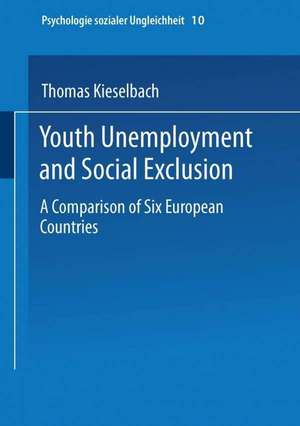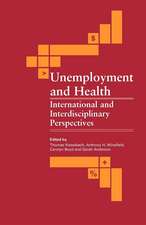Youth Unemployment and Social Exclusion: Comparison of Six European Countries: Psychologie sozialer Ungleichheit, cartea 10
Editat de Thomas Kieselbachde Limba Germană Paperback – 31 ian 2000
Din seria Psychologie sozialer Ungleichheit
-
 Preț: 400.85 lei
Preț: 400.85 lei -
 Preț: 485.61 lei
Preț: 485.61 lei -
 Preț: 397.38 lei
Preț: 397.38 lei -
 Preț: 495.24 lei
Preț: 495.24 lei - 15%
 Preț: 448.39 lei
Preț: 448.39 lei -
 Preț: 413.84 lei
Preț: 413.84 lei -
 Preț: 386.61 lei
Preț: 386.61 lei
Preț: 452.79 lei
Nou
Puncte Express: 679
Preț estimativ în valută:
86.64€ • 90.69$ • 72.11£
86.64€ • 90.69$ • 72.11£
Carte tipărită la comandă
Livrare economică 31 martie-14 aprilie
Preluare comenzi: 021 569.72.76
Specificații
ISBN-13: 9783810029393
ISBN-10: 3810029394
Pagini: 324
Ilustrații: 320 S. 7 Abb.
Dimensiuni: 148 x 210 x 17 mm
Greutate: 0.38 kg
Ediția:2000
Editura: VS Verlag für Sozialwissenschaften
Colecția VS Verlag für Sozialwissenschaften
Seria Psychologie sozialer Ungleichheit
Locul publicării:Wiesbaden, Germany
ISBN-10: 3810029394
Pagini: 324
Ilustrații: 320 S. 7 Abb.
Dimensiuni: 148 x 210 x 17 mm
Greutate: 0.38 kg
Ediția:2000
Editura: VS Verlag für Sozialwissenschaften
Colecția VS Verlag für Sozialwissenschaften
Seria Psychologie sozialer Ungleichheit
Locul publicării:Wiesbaden, Germany
Public țintă
ResearchCuprins
Comparative Report.- 1 International Debate on Social Exclusion.- 2 Weak groups on the labour market.- 3 Social exclusion and youth unemployment within six countries of the EU.- National Reports on Youth Unemployment and Social Exclusion.- Youth Unemployment and Social Exclusion in Sweden.- Youth Unemployment and Social Exclusion in Belgium.- Youth Unemployment and Social Exclusion in Germany.- Youth Unemployment and Social Exclusion in Greece.- Youth Unemployment and Social Exclusion in Italy.- Youth Unemployment and Social Exclusion in Spain.- References.- About the authors.
Notă biografică
Professor Dr. Thomas Kieselbach, head of the Institute for Pychology of Work, Unemployment, and Health (IPG) at the University of Bremen (Germany), interntaional coordinator of "Youth Unemployment and Social Exclusion: Dimensions, Subjective Experiences and Innovative Institutional Responses in Six Countries of the EU" (YUSEDER).
Textul de pe ultima copertă
This volume draws attention to the concept of social exclusion in the context of unemployment as well as to vulnerable groups of young unemployed people with regard to social exclusion in six European countries. It is based upon the results of an international research project (Youth Unemployment an Social Exclusion: Dimensions, Subjective Experiences, and Innovative Institutional Responses in Six Countries of the EU) (YUSEDER) conducted in the framework of the research programme Targeted Socio-Economic Research (TSER) of the European Commission. Partners from six European countries with differing scientific backgrounds (health psychology, public health research, psychatry, industrial sociology, medical sociology) from six European countries participated in this project.
The concept of social exclusion has gained an impressive importance in the European policy debate. The refused entry to the labor market for members of the younger generation increases the risk of social exclusion for the affected youth as well as for the social fabric in general. The contributions of this volume illustrate an initial approach to analysing and comparing theoretical reflections about the meaning and extent of social exclusion for young unemployed people from a comparative perspective. The research has been carried out in three Northern European countries (Sweden, Germany, Belgium) an three Southern European Countries (Spain, Italy, Greece). For each country a specific national report ist presented.
The comparative section describes and attempts to explain the similarities and dissimilarities between countries having rather diverse histrorical and social understandings of being socially excluded or marginalised für young people
The concept of social exclusion has gained an impressive importance in the European policy debate. The refused entry to the labor market for members of the younger generation increases the risk of social exclusion for the affected youth as well as for the social fabric in general. The contributions of this volume illustrate an initial approach to analysing and comparing theoretical reflections about the meaning and extent of social exclusion for young unemployed people from a comparative perspective. The research has been carried out in three Northern European countries (Sweden, Germany, Belgium) an three Southern European Countries (Spain, Italy, Greece). For each country a specific national report ist presented.
The comparative section describes and attempts to explain the similarities and dissimilarities between countries having rather diverse histrorical and social understandings of being socially excluded or marginalised für young people
















